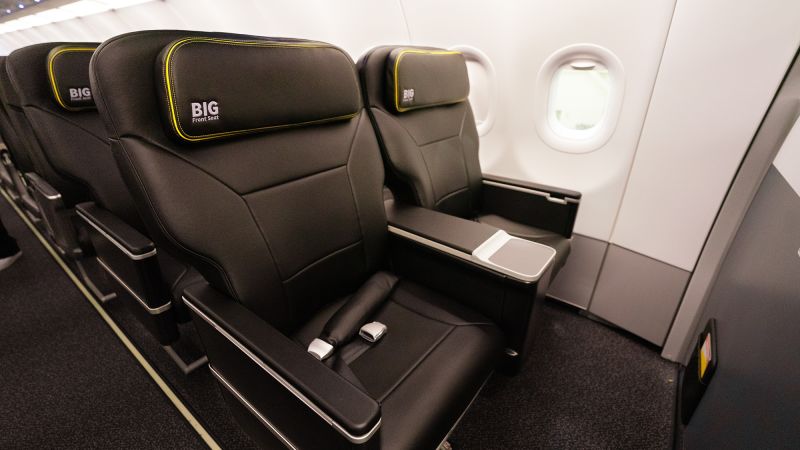Provided by: Spirit Airlines
Ultra-low-cost airline Spirit Airlines will begin offering business class seating.
new york
CNN
—
Spirit Airlines, the ultra-low-cost carrier known for charging passengers for everything they need to fly cheap, is introducing business class seating.
The airline announced that passengers can pay an extra fee to purchase what it calls “Big Front Seats,” which are two pairs of wider seats at the front of the cabin that take up the space of three seats on either side of the aisle. The seats also come with extra legroom. It will also allow passengers to pay extra for seats in rows where middle seats are not sold.
The move comes as the airline industry struggles to make a profit selling budget seats. The trend was started by Spirit Airlines' low, no-frills fares, which allow passengers to choose the cheapest base fare and then pay for extras like carry-on bags, forcing major airlines to restructure their pricing, with many introducing “basic economy” tiers on similarly no-frills tickets.
“We are waking up to a new era in Spirit Airlines' history, taking low-cost travel to new heights with enhanced options unlike anything we've ever offered before,” Spirit Airlines CEO Ted Christie said in a statement.
For airlines, lean tickets have proven a tough way to turn a profit. Spirit Airlines hasn't had a profitable year since 2019, before the pandemic brought demand for air travel to a near halt. It has had some profitable quarters, but has had more loss-making quarters than profitable ones. The company has warned that it will soon report a quarterly loss due to lower-than-expected revenue.
Even as passengers returned to the skies in 2021, low-fare airlines struggled, while big, established carriers like American Airlines, United Airlines and Delta Air Lines reported record profits.
Spirit Airlines first explored merging with another ultra-low-cost carrier, Frontier Airlines, and then with JetBlue Airways, but the latter deal was blocked in January by a federal judge who said the merger would reduce competition and raise fares for passengers.
One of the things that has given the big airlines an advantage over ultra-low-cost carriers like Spirit Airlines is their ability to sell premium seats — wider business- and first-class seats and main-cabin “economy plus” seats that offer more legroom and priority boarding — and these established airlines report that they are getting an increasing share of ticket revenue from passengers who pay for them.
Last week, Southwest Airlines, the nation's oldest low-cost airline, announced that it would end its free-seat policy, which it had adopted since its founding, and would allow passengers to choose their own seats for the first time. The main reason for this change was that Southwest plans to reconfigure its fleet in 2025 to allow passengers to pay extra for extra legroom in one-third of rows. However, Southwest has not made any announcements. Are there plans to offer larger business class seats?
Southwest Airlines was once the most profitable U.S. airline, rarely posting quarterly losses and hadn't reported an annual loss in nearly a half-century until the pandemic hit, but it has struggled financially in recent years and faced activist investors calling for management changes to improve profitability.
—CNN's Erica Tulfo contributed to this report

